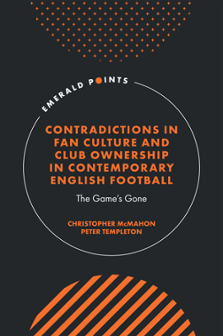
Prelims
Contradictions in Fan Culture and Club Ownership in Contemporary English Football: The Game's Gone
ISBN: 978-1-83549-024-2, eISBN: 978-1-83549-023-5
Publication date: 3 April 2024
Citation
McMahon, C. and Templeton, P. (2024), "Prelims", Contradictions in Fan Culture and Club Ownership in Contemporary English Football: The Game's Gone, Emerald Publishing Limited, Leeds, pp. i-vii. https://doi.org/10.1108/978-1-83549-023-520241008
Publisher
:Emerald Publishing Limited
Copyright © 2024 Christopher McMahon and Peter Templeton
Half Title Page
CONTRADICTIONS IN FAN CULTURE AND CLUB OWNERSHIP IN CONTEMPORARY ENGLISH FOOTBALL
Title Page
CONTRADICTIONS IN FAN CULTURE AND CLUB OWNERSHIP IN CONTEMPORARY ENGLISH FOOTBALL: THE GAME'S GONE
BY
CHRISTOPHER MCMAHON
University of Liverpool, UK
AND
PETER TEMPLETON
The Open University, UK

United Kingdom – North America – Japan – India – Malaysia – China
Copyright Page
Emerald Publishing Limited
Emerald Publishing, Floor 5, Northspring, 21-23 Wellington Street, Leeds LS1 4DL.
First edition 2024
Copyright © 2024 Christopher McMahon and Peter Templeton.
Published under exclusive licence by Emerald Publishing Limited.
Reprints and permissions service
Contact: www.copyright.com
No part of this book may be reproduced, stored in a retrieval system, transmitted in any form or by any means electronic, mechanical, photocopying, recording or otherwise without either the prior written permission of the publisher or a licence permitting restricted copying issued in the UK by The Copyright Licensing Agency and in the USA by The Copyright Clearance Center. No responsibility is accepted for the accuracy of information contained in the text, illustrations or advertisements. The opinions expressed in these chapters are not necessarily those of the Author or the publisher.
British Library Cataloguing in Publication Data
A catalogue record for this book is available from the British Library
ISBN: 978-1-83549-024-2 (Print)
ISBN: 978-1-83549-023-5 (Online)
ISBN: 978-1-83549-025-9 (Epub)

Contents
| Preface | vii | |
| Introduction | Football without Fans is Nothing? | 1 |
| A Game of Two Halves: Who are the Owners? | 3 | |
| For My Sins: Who is ‘The Fan’? | 12 | |
| 1. | PLC United – From Clubs to Corporations | 27 |
| 2. | FC ’til I Die – Economic and Cultural Asset Stripping | 45 |
| 3. | Big Game Players – The Benefactor Model | 61 |
| 4. | Clean Sheets – Sportswashing in Football | 81 |
| Conclusion | The Game’s Gone | 99 |
| About the Authors | 111 | |
| References | 113 | |
Preface
In English football, there is always one underlying assumption: that football is the game of the people. Existing academic work has gone some way to problematise this notion, but anyone who has spent any time in a football stadium, or following a game online, will recognise the power the notion retains even in contemporary fan discourse. However, in an era of buyouts from consortia and sovereign wealth funds, where football clubs become secondary to the financial and political advantages owning them brings, the relationship between football clubs and their fan communities has never been under such strain. Nevertheless, fans continue to turn up games in their thousands, signing up to goals and objectives with which they ostensibly disagree.
We consider the fan – or at least, the idealised image of the fan that suffuses the discourse of English supporter culture – as the underlying foundation for the ideological structures of football. Necessarily grounded in the class concerns that, due to its unique history, underpin the attitudes of the majority of football supporter discourse, successive chapters tackle the dynamic by which football organisations, as global businesses, often operate in ways contrary to the perceived essence of the sports club at the heart of their operation.
Providing insight into different notions of football club ownership, specifically the Public Limited Company, the ‘remodel’ and asset stripping, the benefactor model sometimes thought of as a ‘billionaire’s plaything,’ and the sportswashing project, the authors raise significant issues faced by football club fandoms. How do fans who are forced to accept, as part of their club, ramifications that run so counter to their own histories and identities continue to turn up every week? And for the rest of us, even in less contentious cases, does the unifying entity that is the football club that holds a significant place in the hearts and minds of individuals and communities even exist anymore?